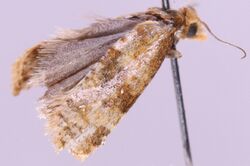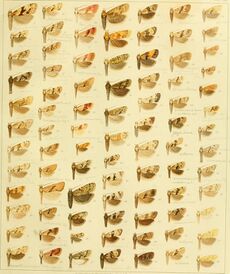Biology:Gynnidomorpha vectisana
| Small saltern conch | |
|---|---|

| |
| Scientific classification | |
| Domain: | Eukaryota |
| Kingdom: | Animalia |
| Phylum: | Arthropoda |
| Class: | Insecta |
| Order: | Lepidoptera |
| Family: | Tortricidae |
| Genus: | Gynnidomorpha |
| Species: | G. vectisana
|
| Binomial name | |
| Gynnidomorpha vectisana | |
| Synonyms | |
| |
Gynnidomorpha vectisana, the small saltern conch, is a moth of the family Tortricidae. It was described by Henry Noel Humphreys and John O. Westwood in 1845. It is found in China (Henan, Jiangxi, Jilin, Xinjiang), Japan , Korea,[3] Ireland, Great Britain, Scandinavia, the Benelux, Germany , the Czech Republic, Slovakia, Hungary, Romania, Switzerland , Austria, Italy, Spain , the Baltic region and Russia . The habitat consists of saltmarshes, fens, wet heathland and freshwater marshes.[4]
The wingspan is 9–12 mm.[5] The forewings are elongate, with a gently arched costa.The ground colour is brownish-ochreous, sprinkled with dark fuscous, towards termen and on dorsum strigulated with dark fuscous. There is a narrow obscure rather dark fuscous median fascia, somewhat angulated and interrupted near costa, connected in the middle with the tornus by an oblique dark suffusion.Also there is a fuscous spot on the costa towards the apex. The hindwings are rather dark grey.[6][7]
Adults are on wing from late May to June and again from July to September in two generations per year.
The larvae feed on Plantago maritima, Triglochin palustris and Salicornia species. First generation larvae feed on the flowerheads, while the second generation feeds on the shoots and rootstock.[8]
References
| Wikimedia Commons has media related to Gynnidomorpha vectisana. |
- ↑ Tortricidae.com
- ↑ Fauna Europaea
- ↑ A Brief Summary of Tribe Cochylini from China (Lepidoptera: Tortricidae: Tortricinae)
- ↑ Hants Moths
- ↑ "Microlepidoptera.nl". http://www.microlepidoptera.nl/soorten/species.php?speciescode=360910&p=1.
- ↑ Meyrick, E., 1895 A Handbook of British Lepidoptera MacMillan, London pdf
 This article incorporates text from this source, which is in the public domain. Keys and description
This article incorporates text from this source, which is in the public domain. Keys and description
- ↑ Julius von Kennel. 1921, The Palaearktischen Tortriciden, eine monographische Darstellung. Stuttgart: E. Schweizerbart'sche Verlagsbuchhandlung. 742 pp. - Palaearctic Tortricidae, a monograph.pdf at Zobodat 278-279
- ↑ UKMoths
Wikidata ☰ Q11969158 entry
 |


